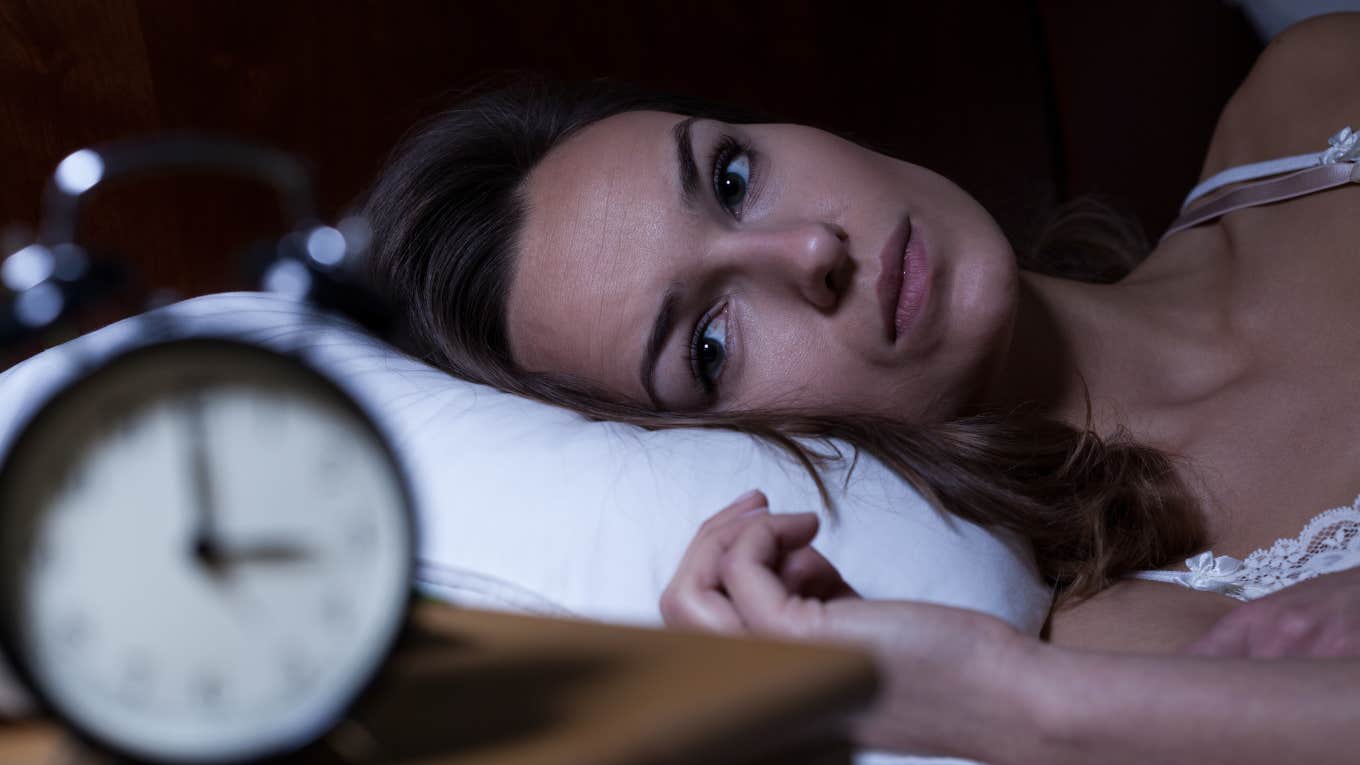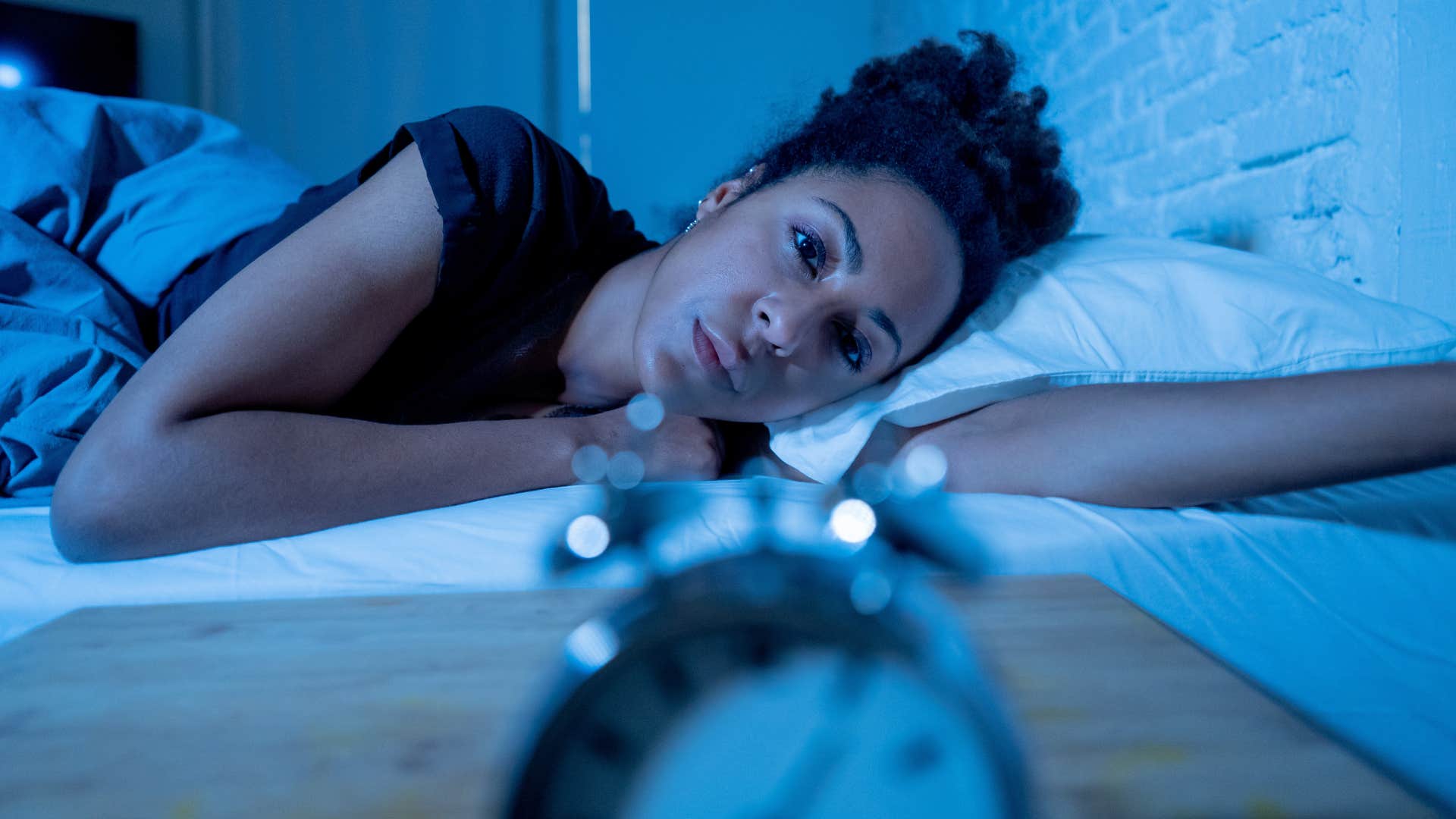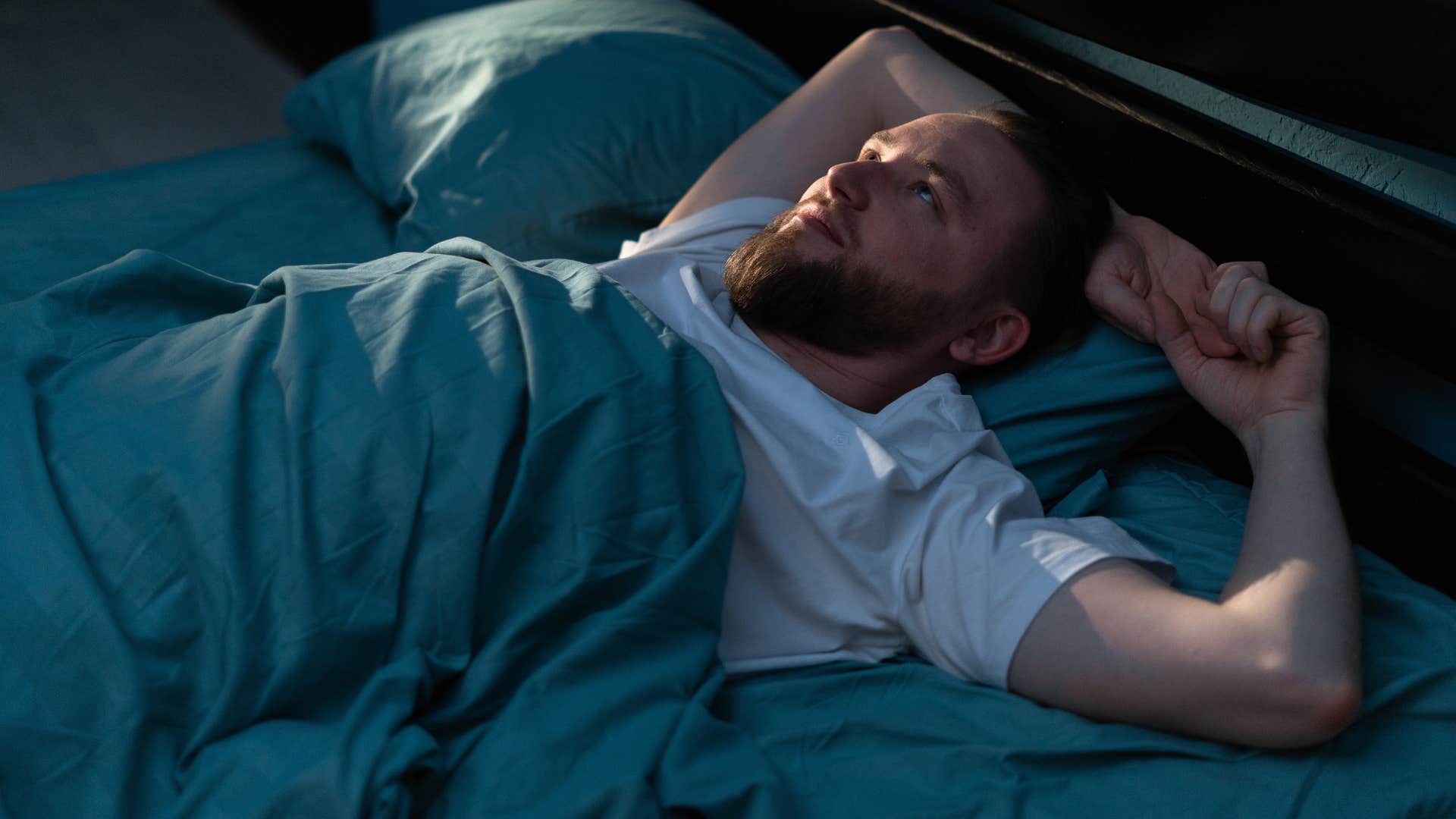11 Reasons Secretly Brilliant People Usually Struggle To Fall Asleep
The smartest people you know just can't seem to sleep.
 Ground Picture | Shutterstock
Ground Picture | Shutterstock People who find it difficult to fall asleep may blame it on work, their relationships, or their busy lives. Not only is not getting enough sleep incredibly stressful, it's downright dangerous. But there may be a link between not getting enough rest and a high level of intelligence, as there are very specific reasons secretly brilliant people usually struggle to fall asleep.
Due to their brilliant minds, these people just can't seem to stay well-rested. Whether it's their creative thinking or constantly having an existential crisis, sleep is something their bodies seem to reject. And despite how much their parents, teachers, or peers may praise them for their intellect, there's a darker side to being brilliant that begins once the lights are out.
Here are 11 reasons secretly brilliant people usually struggle to fall asleep
1. Their creativity peaks at night
 Evgeny Atamanenko | Shutterstock
Evgeny Atamanenko | Shutterstock
If there's one thing about a brilliant person, it's that their mind works in a different way. Unlike average people, their thoughts aren't always so simple and, as a result, they're often conjuring up plans they may or may not get to.
In a study published in Frontiers in Psychology, researchers found a link between creativity and high intelligence. People with above-average intelligence or high intelligence (not above an IQ of 120) tended to be more creative. However, there is a downside to this, as those creative thoughts pop in at the worst of times, effectively disturbing their sleep for the night.
Luckily, it doesn't have to remain this way forever. For those who find themselves unable to sleep at night due to their creative mind, it might help to get up and spend 15 minutes writing down their thoughts. Finding healthy ways to express those thoughts in a reasonable time frame is much better than tossing and turning, after all.
2. They're incredibly anxious
 Antonio Guillem | Shutterstock
Antonio Guillem | Shutterstock
Because of how quickly their mind works and the sheer amount of thoughts that pass through their brain at any given moment, one of the major reasons secretly brilliant people usually struggle to fall asleep is due to their anxiety. And it's sure to cause overwhelming feelings and panic, especially as they're planning to hit the hay.
Those with a brilliant mind also tend to have darker thoughts than the average person. According to a study published in the journal Intelligence, there's a greater level of anxiety disorders among those who are highly intelligent. While it might sound intimidating, seeking professional help brings people one step closer to getting better sleep.
3. They overanalyze everything
 fizkes | Shutterstock
fizkes | Shutterstock
Intellectual people are the GOATs of overthinking everything. From work to romantic relationships, their minds run a million miles a second, thinking of everything they've done that day as well as decisions they made decades ago.
While they are dedicated to details, they simultaneously let their thoughts hold them back from taking risks and doing what's necessary. Even worse, at night, they can't seem to turn off this overanalyzing brain of theirs, causing their sleep to suffer. It can turn dangerous, as a lack of sleep can lead to an increase in diabetes, obesity, workplace accidents, and cardiovascular morbidity, according to a study published in the journal Healthcare.
4. They don't like wasting time
 SB Arts Media | Shutterstock
SB Arts Media | Shutterstock
It's understandable why brilliant people are the way that they are. As a result of their minds, they are always on the go and rarely have time to rest. Because of this, they can't stand to waste time. They want to use their mind to help others or progress in their career, but sleep often gets in the way of things.
While sleep is essential for good health and well-being, brilliant people may see it as a chore and don't take it that seriously. This leads them to lose sleep as they'd much rather be working or doing something productive. However, before they continue to keep up with that harmful behavior, they should stop and think for a second: isn't resting also productive?
According to a study published in Neuropsychiatric Disease and Treatment, sleep deprivation leads to worse cognitive performance and mood, all of which can impact their work. While it might be tempting to roll their eyes and continue working, a break is an absolute must.
5. They're night owls
 Milan IIic Photographer | Shutterstock
Milan IIic Photographer | Shutterstock
Not everyone is designed to wake up early or flourish in the morning. Some people are night owls, meaning they prefer to stay up into the wee hours of the morning, whether it's playing games, reading a book, or getting chores done. There's also a link between brilliance and staying up late.
According to a study published in BMJ Public Health, people who sleep late tend to have higher cognitive function. And for better or worse, brilliant people much prefer to stay up at night than wake up early and start their day. Blame it on their brilliant nature, but nothing is stopping them from avoiding resting at a "normal" time.
But balance is key, especially when it comes to rest. And while brilliant people can't convince themselves to get eight hours of sleep, if their health is suffering, they should consider setting a schedule in which some days they stay up and some days they go to bed early.
6. They thrive on unpredictability
 PeopleImages.com - Yuri A | Shutterstock
PeopleImages.com - Yuri A | Shutterstock
The smartest people out there are a bit unpredictable. From speeding on the road to performing high-risk jobs, they prefer to live life on the edge rather than following the rules. Clinical psychologist Angelica Shiels theorized that people with a high IQ of 130 tend to do riskier things because they want to feel more alive, since their everyday life is not challenging enough.
Even so, unpredictability can quickly lead to an intense amount of stress. As much as they don't want to hear it, the human brain thrives on predictability and, as a result, tends to freak out and become tense when life gets too unpredictable too often.
While it might be fun, it's important to seek professional help. There are therapists out there who specialize in dealing with highly intelligent people and can help them reel themselves back in when things get a little crazy.
7. They feel responsible for the world's problems
 Antonio Guillem | Shutterstock
Antonio Guillem | Shutterstock
While many people enjoy their intelligence and thrive in it, the downside is that these people often see things others don't. From thinking about how world events will play out to stressing over the economy, one of the big reasons secretly brilliant people usually struggle to fall asleep is because they feel responsible for everything wrong in the world.
They're constantly wondering how they can help others or how doomed everything is, causing them to spiral out of control. And this amount of responsibility is bound to make them feel isolated and misunderstood.
According to the American Psychological Association, isolation leads to depression and poor sleep quality, so while it might feel great to be brilliant, they tend to worry quite a lot about things that are well beyond their control.
8. They get stuck in a 'what if' loop
 Lysenko Andrii | Shutterstock
Lysenko Andrii | Shutterstock
Brilliant people always have a million different scenarios jumping around in their heads. From worrying about their job to wondering how their relationship with others will play out, they tend to get stuck in an endless loop of "what ifs."
They simply can't help but worry about everything, especially because so many people rely on them to lead. As a result, they have an immense amount of responsibility on their shoulders and don't want to disappoint anyone, often going into perfectionism or worry mode.
Unfortunately, according to the American Psychological Association, stress impacts all systems of the body, meaning it can have far-reaching consequences. It's great to analyze and think about the consequences of your actions, but people shouldn't worry too much, as they can't control the past or future.
9. They want to take advantage of the peace
 Antonio Guillem | Shutterstock
Antonio Guillem | Shutterstock
Very rarely do brilliant people get a chance to breathe. Maybe it's because they're so smart, but they're constantly bombarded with thoughts and problems that people need fixing. When they get home after a long day of worrying, the last thing they want to do is go to sleep, which is why they want to take advantage of the peace before the storm.
It sounds depressing, but because their brain can't catch a break, they're often staying up late to play video games or reading to avoid their problems. It's really just another way for them to turn off their brain so they don't have to think too much about life's problems or what's going to happen the next day.
But it's important for them to get in touch with themselves and work through those worries before relaxing. By journaling what they're grateful for, what they're worried about, and what they can control, it's much easier to push those negative thoughts away.
10. They're in tune with their bodies
 Pheelings media | Shutterstock
Pheelings media | Shutterstock
Despite what some may think, intelligent people are highly in tune with their bodies. From the anxiety that they experience to their immediate surroundings, they have a knack for paying attention to things that others would ignore. But being so connected to their bodies is also one of the glaring reasons secretly brilliant people usually struggle to fall asleep.
They don't abide by a set schedule. They're often focused on what feels right versus what is right. So when the sun sets and it's a time where average people begin getting ready to rest, they listen to their bodies, which likely tell them it's time to keep going.
Sometimes people must do what logically makes sense for them rather than depend on how they feel. Even so, most brilliant people don't care for logical reasoning when it comes to sleep, causing them to stay awake.
11. They're sensitive to their environment
 Lysenko Andrii | Shutterstock
Lysenko Andrii | Shutterstock
Brilliant people notice every little thing about their environment. From the slight breeze coming in through their window to their pet snoring, they can't help but be hyperfixated on it. As a result, they find it much harder to fall asleep than the average person. Unless the room is quiet, pitch black, and soundless, they are almost always struggling to fall asleep.
But according to sleep medicine physician Dr. David Rosen, there are a few steps they can take, advising, "For those struggling with a noisy sleep environment, be prepared for some trial and error. For example, you might find ear plugs to be helpful at first, but over time you may find you prefer the noise of a fan. Go into this with an open mind and you can find the right solution, because you deserve a restful and quiet sleep environment."
Marielisa Reyes is a writer with a bachelor's degree in psychology who covers self-help, relationships, career, family, and astrology topics.

